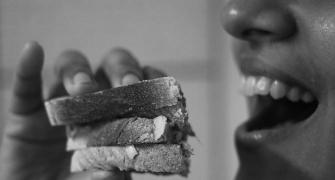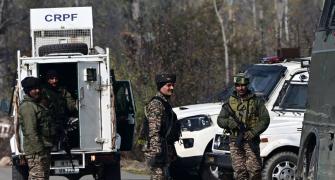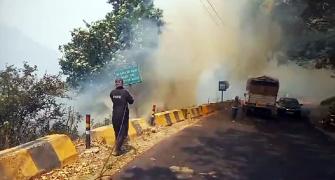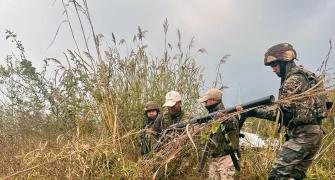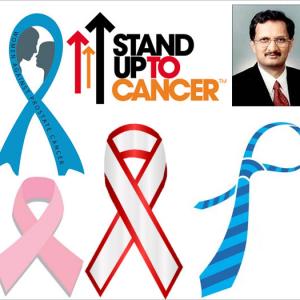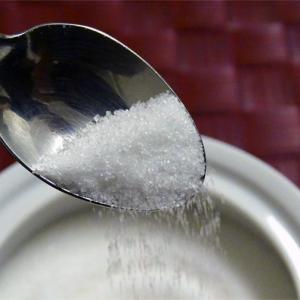'Live a healthy lifestyle. Like what our parents taught us. Like our parents' parents taught them.'
'We become obese. In obesity the chance of cancer increases.'
'Any new symptom? Please talk to your doctor. Some screening test might need to be done.'
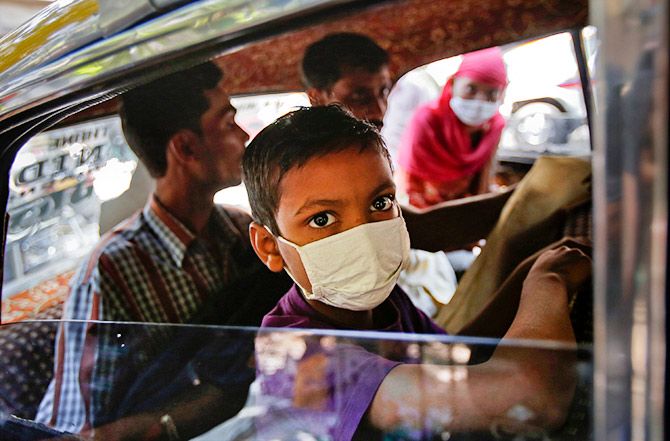
Dr Kumar Prabhash was 70 minutes late for his appointment with Rediff.com at his office at the Tata Memorial Centre, Parel, central Mumbai.
But when you had a look at the overwhelming number of patients that swarmed the main lobby, each floor's lobby, the areas in front of the bank of lifts and spilled into the corridors on every storey of the Tata Memorial Hospital, many of them queued outside Dr Prabhash's door, you instantly overlooked the delay.
They need the doctor's time much, much more than you do.
Tata Memorial, the largest cancer hospital in India -- neat, tidy, odourless, in spite of the thousands of patients it caters to daily -- is a microcosm of the nation.
People from every faraway corner of our country -- rich or poor, farmer or businessman, villager or urbanite, toddler or the elderly, as many women as there were men, Northeasterners or Eastern Maharashtrians, of every religion and ethnicity -- were there for treatment, their luggage also in tow.
Everyone patiently waited to see a doctor. Given the queues it was a long, long wait. Often without a chair.
The scene was heartbreaking. So many patients were hairless. So many wretchedly emaciated.
Wasted. Bandaged. Masked. Attached to drips or nasal tubes or ports. In wheelchairs.
Stretched out on thin bedsheets on the floor exhaustedly sleeping.
Some of them missing an extremity or hobbling along.
All surrounded by family; hardly a patient was there alone.
Quite a few appeared at death's door.
All clutched plastic bags of medical reports. All nursed hope.
If you haven't been to an Indian cancer hospital lately, the sheer numbers at Tata Memorial strike you sharply. They are much more than any other hospital. Just how many people in India suffer from cancer?
Doctors and nurses wade their way through this impossible crowd, unwearyingly coping with it.
Run autonomously, with government funding, Tata Memorial is about double the size of any other cancer facility in India, although the government has set up regional centres in each state. Hence the multitude of patients beating a path to Parel where the hospital is located.
Dr Prabhash, associate professor at Tata and a medical oncologist, who treats lung, head and neck cancers through chemotherapy, targeted therapy and immunotherapy, sees a lot of lung cancer (about 1,100 cases a year), among others.
Today, one was seeing him against the background of his workplace. The first meeting was a few weeks earlier on the sidelines of a press conference, where he was one of the medical specialists who explained the concept of liquid biopsy, a non-invasive screening test, that has been introduced in India by Bengaluru laboratory Medgenome under the name of Oncotrack.
When cancer has wrested control of a human body, its DNA molecules can be found wandering in the bloodstream too.
After the initial diagnosis, each standard additional invasive biopsy poses a risk, since it is actually a surgical procedure delving physically into delicate tissue.
Now subsequent biopsies to judge the disease's spread and the efficacy of treatment can be quite handily done through a liquid biopsy for deep-seated species of cancer. (Please see box below for a detailed explanation.)
In India it is a particularly convenient tool for patients located in rural areas who have returned to their homes after a round of treatment. Sending blood samples is certainly easier and less costly than having the patient return.
Tata Memorial, says Dr Prabhash, had done its own tests on liquid biopsies, in-house, with scientists Dr Amit Dutt and Dr Anuradha Chougule, and are still looking to improve the liquid biopsy technique.
The liquid biopsy is priced between Rs 12,000 and Rs 24,000, but Medgenome and others are working to bring this price down as soon as possible to a few thousand rupees.
At the moment liquid biopsies are only being used in India for lung cancer, though research is on at Tata and elsewhere, for it to be used in other tumours/mailgnancies.
In a rapidfire Q&A at Tata Memorial with Rediff.com's Vaihayasi Pande Daniel, during time, one is guiltily aware, that had been stolen away from his hordes of patients, Dr Prabhash explained some more on liquid biopsies and a few important aspects of cancer we all need to know about, now that India will see 1.73 million new cases of cancer and 880,000 cancer deaths by 2020 (according to Medgenome).
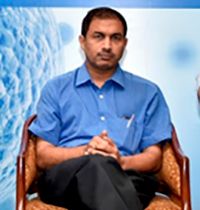
I have been standing outside your office for a while. Looking at the numbers it is pretty evident that cancer is definitely on the increase.
What are the new types of cancers you are seeing? What are the new factors, stemming from modern life today, that cause cancer?
I wouldn't say we are seeing new cancers. As we have understood cancer better, we are classifying it better. Because of that classification, we are able to treat them better.
These cancers have always been there. It is not as if there are new cancers.
Has modern life increased or changed the number of cancers we are seeing? It appears that the modern lifestyle does have some bearing on the number of cancers we are seeing.
One of the (factors) is ageing.
The more you age, the chance of cancer anyway increases. You can't do much about it.
Because humans have greater longevity?
So more cancer will happen.
Second, yes, is smoking, which is a part of our relatively modern lifestyle, is a problem and definitely linked to cancer, apart from the pollution.
Many of the carcinogens which are there in are environment (increases the chances of cancer).
So there are lifestyle changes... and it does have bearing on our having cancer.
Anything else about our modern life that contributes to a higher occurrence of cancer?
Apart from smoking, the way we live.
We don't exercise. We have a sedentary lifestyle.
We become obese. In obesity, the chance of cancer increases.
The kind of food we take. We take lesser and lesser fibre. That again also contributes to cancer.
Colon cancer?
Absolutely.
Indian food has always been traditionally very healthy. But we are changing what we eat?
Because we are adopting a lot of (aspects) of Western lifestyle, many things, including food habits. That gets reflected in the kind of food we eat.
Usually our traditional food has had more fibre; it is more healthy food.
But having said that, many of the things we eat are not always healthy. Like sweets. We take a lot. Not always healthy.
But I do agree we should adopt more of the healthier side of (Western) food habits rather than the unhealthy side of food habits from the Western world.
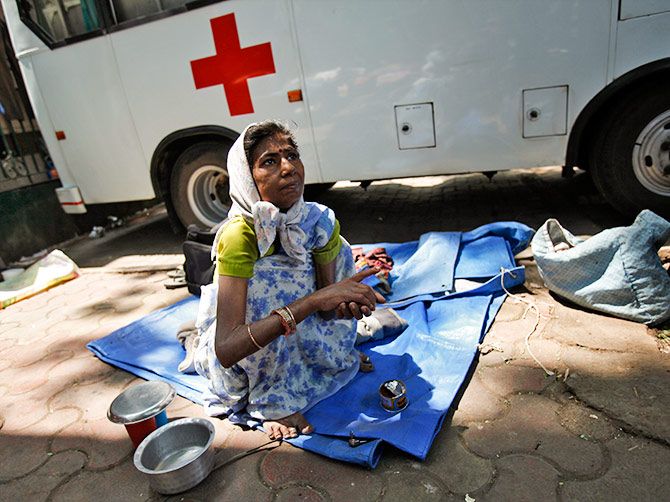
What about the actual quality of our food. Now eggs don't reach us from the healthiest sources. Nor is chicken coming from the best environment? And we are eating more processed food?
No one knows. That is stretching it a bit too much.
As of date there is no certain or clear scientific proof that it is a cause. Otherwise, it would have been banned. Processed food is not considered carcinogenic.
According to the US National Cancer Institute, a liquid biopsy is a test done on a sample of blood to look for cancer cells from a tumour circulating in the blood or for pieces of DNA from tumour cells that are in the blood.
It is a non-invasive screening test -- quite unlike a surgical biopsy -- and is about merely examining the blood of a cancer patient.
Liquid biopsies have slowly become a standard feature for the treatment of lung cancer, in particular, all over the world. Lungs being way too delicate to withstand multiple surgical biopsies are best served by a liquid biopsy,
Heavily funded research is on globally to expand and utilise the huge diagnostic and treatment potential liquid biopsies could have for oncology.
The concept of liquid biopsies was introduced into India by the Bengaluru laboratory Medgenome under the name of Oncotrack. Research on liquid biopsies continues at Medgenome and at the Tata Memorial Centre simultaneously.
The aim is to further reduce the cost of the test, improve its accuracy (it is 97 percent at the moment) and to expand its application to other types of cancer tumours like colon cancer, melanomas, ovarian cancer.
Thus far in India liquid biopsies are only being used for treatment of lung cancer. Not for the diagnosis of lung cancer or any other cancer. Nor is it a predictive test to judge for an individual's genetic predilection for cancer.
It 1. Assists in planning the course of treatment for lung cancer
2. Helps ascertain how well a certain line of treatment is working for a lung cancer and
3. Is useful for detecting for lung cancer relapses.
Liquid biopsies for treatment of lung cancer have been instituted in just a few laboratories and cancer centres in India, but it is set to expand very soon.
The scientific basis for liquid biopsies, according to Medgenome is: 'Dying cancer cells release their mutated DNA into the bloodstream, enabling determination of mutation type and relative tumour volume. By capturing and sequencing these tumour derived cell free DNA, tumour genomics can be reconstructed without needing to perform the biopsy of the tumour, and hence this is also called liquid biopsy.'
When you leave the environment of your hospital and meet average educated Indians, what are some very simple things that you feel the Indian public doesn't know about cancer?
We get all kinds of patients here, from the richest to the poorest. That's the advantage of this hospital. But the reasons remain similar. Habits decide (your risk of cancer).
For the poor, if their (environment) is unhygienic, the chances of certain cancers increases. Like cervical cancer.
What you eat (has a bearing) if you are staying in a very polluted area. The chances of getting cancer increase...
When you meet educated people in social circumstances what are some of the things they just don't know about cancer?
The most important thing, that they don't know, is that many of the cancers can be picked up. There is ignorance on (how) cancer happens. And how common cancer is.
Second, (there is ignorance) about the symptoms. (If they recognised the symptoms) they can meet the doctor early.
They don't know, so they come late. The chance of cure decreases.
You feel they should know some of these things since they are educated?
We hope that.
But at certain times we make presumptions. If there is no teaching (of awareness) there is no awareness, then how will they know. We can't simply presume.
But yes, cancer is an area where we don't know many basic things. It is important that we use all kinds of forums so they learn about it.
You said there is a lot of cancer in India these days? How much is a lot?
Yes, in India cancer is increasing. There is Indian government data about it, year by year, what is happening.
Year by year, it looks like cancer is increasing.
If there is a lot of it, how does its prevalence compare to say heart disease or diabetes in India?
I wouldn't say a lot of it, because we are 1.3 billion people. Whatever number you take, it is a lot.
But compared to the Western world, the incidence of cancer is less in India. The number is (only) high because we are a huge number.
Why do you say the incidence is less in India compared to the West?
Because we have compared that for every 100,000 patients what is the number of cancer patients in India, as compared to the Western world. It is one-third or one-fourth.
Why?
There are various reasons.
One of the most important reasons is that our average age is less. We have 67 per cent people who are less than 35 years of age
We have a young population?
Yes, we are a younger population and the Western world is an ageing population.
Apart from that many others things. Smoking is high there.
But we also have scores chewing tobacco?
But they smoke tobacco.
We chew gutka...
Absolutely. These are the differences. But they still have a higher incidence.
Theirs is a more sedentary lifestyle (for instance). So there are other issues, most important is ageing.
What should an average young Indian know about protecting himself or herself from cancer?
Live a healthy lifestyle. Like what our parents taught us. Like our parents' parents taught them.
If there is any new symptom: Talk to your doctor.
Many times we miss those symptoms.
If I have an ulcer in my mouth, which is not going away, show it to a doctor.
Any new symptom? Please talk to your doctor. Some screening test might need to be done.
Most important is: One, a healthy lifestyle -- exercising and eating healthy -- and two, meeting the doctor if there is any new symptom.
I can see that at Tata Memorial you are swamped by the number of patients that have to be seen on a regular basis. It must be very difficult for your rural patients to make it here.
Very tough for them.
The good thing is, at least, at this hospital 70 per cent of the patients we cater to are poor patients.
We have many common programmes which ensure that we are able to deliver care to them.
What are the ways in which you cater to your rural patients?
Ageing people from rural areas, who would have a higher incidence of cancer, would have difficulty getting to urban cancer centres.
I cannot deal with anything unless it comes here.
We offer all kinds of back-up (support) and all kinds of resources, so that their stay can happen, their funding can happen, their treatment can happen. We do provide many things from the (side of the) hospital.
As a cancer specialist what do you think is crucial for cancer care to improve for rural populations?
There should be a hospital nearby to the rural areas, so that more patients can take their treatment there. There are not enough rural cancer centres.
How have liquid biopsies made your life as a cancer doctor easier?
Liquid biopsy is a test which is done in the blood and which is also done in the tissues.
It is easy to take blood. It is less traumatic to the patient. It makes life easy for the patient.
Indirectly it makes it easier for me, because I am always concerned that if we want to do the test in the tissue, if we do the biopsy, there is a chance of more complications in the patients. So in that way it makes our life more easy.
Because of liquid biopsy, we hope we will have better monitoring, once the treatment has begun.
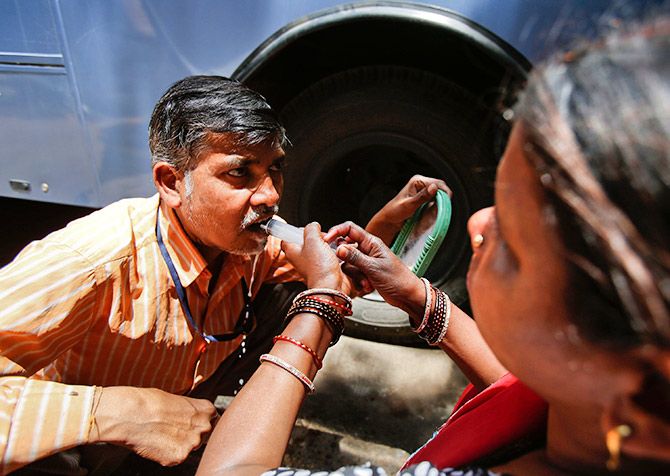
Why is it important for more and more people to know about the availability of a liquid biopsy given that it is not a test of choice for the first diagnosis?
If in any way, for any modality, if awareness increases, it is always good.
Your readers need to know that there is now a liquid biopsy, which is an important test in certain situations, that is available in India.
If someone wants to use it, they now can.
But can a liquid biopsy be used for an elderly patient in a rural area who is not able to get to a cancer treatment centre?
Wouldn't a liquid biopsy be better than no test at all?
You need to have a diagnosis. (S/he) needs to go to a local doctor, get the diagnosis and in certain situations, it is helpful. It is a good incremental benefit.
Science is always incremental. We think one test can change everything in life. No, it does not happen that way.
It is a good incremental benefit for patients. It hasn't solved all the problems for every patient. No. It is an incremental benefit, but an important one.
How can the costs of cancer treatment be reduced?
At Tata Hospital we keep trying to develop chemotherapy regimens which are less costly, tests which are less costly.
This test is also now less costly since when it was developed; So more and more patients have access.
But should the government have more control on medical and hospital costs, especially in the case of cancer?
The government is working on controlling the drug costs.
But this needs to be in our culture. You can have a corporate hospital. But we need to make alternate hospitals, where the costs are going to be as minimal as possible. And with good optimal care.
And Tata is a good example of that kind of hospital?
Yes, if you ask me, I feel so. I am a biased person, because I work at Tata.



